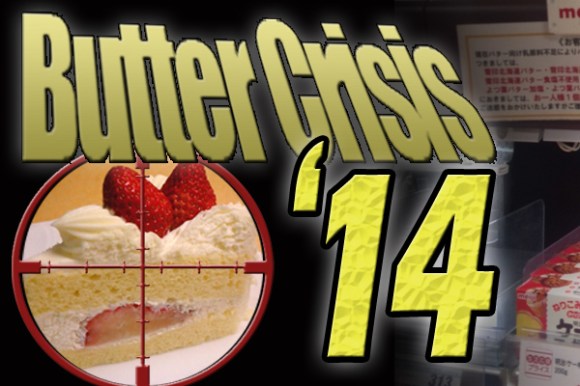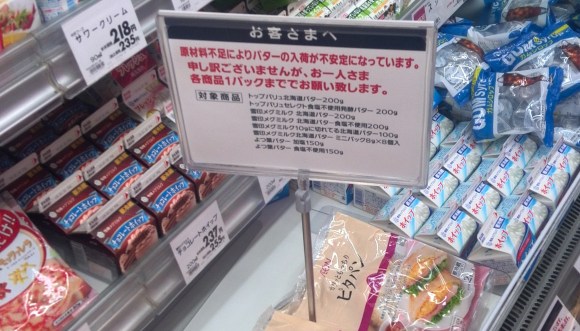
For months now a crisis has been brewing in the dairy industries of Japan. However, like the gooey sweetness of a melting pat of butter penetrating the crevices of a piece of toast, the effects have only recently begun to seep into the general population. We’re still only in the early stages though and things are bound to get worse before they get better.
Some readers who live in Japan may have noticed that the cost of butter has been significantly higher in recent months. In other cases shelves have gone empty and purchases are limited to one per person.
Now the writing is smeared on the wall: Japan is running out of butter… and fast.
■ How bad is it?
According to the Ministry of Agriculture, Forestry and Fisheries (MAFF) nationwide butter supplies have taken a dip of 30 percent from the same time last year and are down to the lowest amounts since 1991. And as supplies dwindle away the value of remaining butter goes up. MAFF also reported that the cost of a kilogram of yellow spread has gone up to 1,390 yen (US$12.75), the highest in almost three decades.
▼ “On TV they were talking about a butter shortage. Certainly, the other day I wanted some so I went to the store, but there was none.”
https://twitter.com/mocheef/status/526981470661779456Actually this isn’t the first butter shortage Japan has faced. They have occurred in 2008, 2011, and 2012 as well. However, this is looking to be the most severe we have ever seen. In May and September the MAFF enacted emergency imports of butter to help ease the situation. This is the first time two emergency imports had been done in a single fiscal year.
■ Ripples
Currently supermarkets all over the country are posting signs apologizing for limited supplies and high prices while shoppers everywhere are adjusting their cooking plans accordingly. “Looks like I won’t be making my white stew” said one despondent Osaka shopper eying a sign limiting her to only one pack. Another in Tokyo placed her 200g tub back on the shelf after catching sight of the 400 yen ($3.67) price tag it carried.
However, these are just the first signs of buttery doom in Japan. The real hit will happen when other food’s producers start running out. Major companies like Morinaga and Meiji can sit on their plentiful supplies to ride out the crisis for a while but are already making moves in anticipation of tougher times ahead.
▼ “This year the butter shortage will be a disaster for year-end cakes. Maybe ice cream cakes will become the safe move for birthday and Christmas parties…”
https://twitter.com/vinxx_malee/status/526861019675492352The first to be affected are smaller bakeries who require relatively large amounts of butter to keep their modest supplies of bread flowing. Some of you may have noticed a slight change in the taste of your daily bakery-bought bread already – a change of the less fatty persuasion.
■ Why?
The reasons behind this shortage are numerous and complexly intertwined. To put it simply, there’s less milk because dairy farmers are hanging up their cows at an alarming rate recently. This is partly due to the long-occurring demographic shift to older and fewer people in rural communities. However, the pain of dairy farmers has been amped up by the recent TPP talks which threaten cheaper imports that will put them out of business. Basically, many are feeling it’s just not worth it anymore.
Other reasons like a decline in the birthrate of dairy cows due to hotter than usual summers and a rise in cattle feed costs due to a weakening yen play a role as well, but this all should be leading up to the million dollar question.
■ Why only butter?
If Japan is producing less and less milk, then how come there’s no milk shortage? An article in Asahi Shimbun proposes that due to limited resources of raw milk, priority is directed to producing drinkable milk since, litre for litre, it’s the most profitable.
Assuming that’s true, it still doesn’t tell us why there’s no cheese, yogurt, ice cream, or pudding shortage as well. To explain this, many have begun pointing fingers at the Agriculture & Livestock Industries Corporation (ALIC). Some refer to this group as a “golden parachute organization” (amakudari dantai), a private company with close ties to government operations and made up of retired government members looking for cushy corporate gigs.
According to accusations, the ALIC is the only company that can import butter to Japan. Apparently, in order to protect Japanese dairy farmers, large “virtual tariffs” are placed on any foreign butter looking to enter the country. One estimate claims that a 500 yen ($4.60) amount of butter from another land would wind up costing over 2,000 yen ($18.34) by the time it hits store shelves.
▼ “The tariff on butter is virtually 360 percent. Cheese is 30 percent. This is the reason there’s no cheese shortage but a butter one. This year with the domestic butter shortage, imported butter is on the rise. The tariffs also increase. Also I write “virtually” because rather than a formal tariff this money goes to an MAFF golden parachute group.”
バターの関税は実質360%、チーズは30%、これがチーズは不足しないのにバターは不足する理由。今年は国産バター不足で輸入バターの量が増えて関税はさらに増やされた。なお「実質」と書いたのは正式の関税ではなく農水省天下り団体への上納金だから。そこまで国産バターを守る必要あるのかな。
— 馬場正博 (@realwavebaba) December 8, 2011
As a result the ALIC could stand to gain considerable profit from a domestic dairy shortage, however, they don’t seem to have the power to trigger it by themselves.
■ Down with TPP?
Tales of shady public/private organizations orchestrating the nation’s butter supply like some slippery puppet are romantic but don’t add up in the end. Since ALIC’s role in this instance is to protect Japanese butter producers it wouldn’t benefit from the entire market going rancid, as its own purpose would cease to exist.
A more likely theoretical scenario could be that this is all just be one final cash grab from an inevitably dying industry before the TPP agreement comes in and floors the Japanese dairy industry for good. Even if it doesn’t wipe out Japanese farmers, the TPP would still appear to render ALIC’s protectionism-for-profit sector obsolete.
Conspiracy theories aside, it doesn’t change the fact that dairy farmers in Japan are giving up the ghost en masse and it doesn’t look like anyone’s willing to fill their place. This means that our butter will gradually come from other countries either by “emergency” imports, pricey ALIC managed imports, or a free trade agreement. Until that happens, it looks like those of us in Japan are going to have to tighten our belts.
You know, because of all the weight we’re going to lose without any butter around.
Source: Naver Matome, Asahi Shimbun, Senkyo173, Dokusho wa Kokoro no Eiyo (Japanese)
Cake Image: Wikipedia – Tomomarusan


 Where’s my Christmas cake?! Seasonal celebrations threatened by nationwide butter shortage
Where’s my Christmas cake?! Seasonal celebrations threatened by nationwide butter shortage Orange Juice Crisis ’24 – Japan’s OJ supplies drying up
Orange Juice Crisis ’24 – Japan’s OJ supplies drying up New smartphone game turns car models into anime girls with model-worthy looks
New smartphone game turns car models into anime girls with model-worthy looks Japanese department store rooftop is a secret oasis where you can escape the crowds in Tokyo
Japanese department store rooftop is a secret oasis where you can escape the crowds in Tokyo Here’s why you should visit Japan’s best winter-night hot spring town on a summer afternoon【Pics】
Here’s why you should visit Japan’s best winter-night hot spring town on a summer afternoon【Pics】 Japan has vending machines that put protective film on your phone for you — Here’s how to use them
Japan has vending machines that put protective film on your phone for you — Here’s how to use them 566 million yen in gold bars donated to Japanese city’s water bureau
566 million yen in gold bars donated to Japanese city’s water bureau How to make curry in a rice cooker with zero prep work and no water[Recipe]
How to make curry in a rice cooker with zero prep work and no water[Recipe] Massive Godzilla figure stands more than six feet tall, costs more than $40,000
Massive Godzilla figure stands more than six feet tall, costs more than $40,000 Shibuya Station’s Hachiko Gate and Yamanote Line stairway locations change next month
Shibuya Station’s Hachiko Gate and Yamanote Line stairway locations change next month Deer killed by man with axe in Nara
Deer killed by man with axe in Nara Sakura jelly desserts are beautiful and back on sale so your “cherry blossoms will bloom”
Sakura jelly desserts are beautiful and back on sale so your “cherry blossoms will bloom” The 10 most annoying things foreign tourists do on Japanese trains, according to locals
The 10 most annoying things foreign tourists do on Japanese trains, according to locals Starbucks Japan releases new sakura goods and drinkware for cherry blossom season 2026
Starbucks Japan releases new sakura goods and drinkware for cherry blossom season 2026 Naruto and Converse team up for new line of shinobi sneakers[Photos]
Naruto and Converse team up for new line of shinobi sneakers[Photos] Is Sapporio’s Snow Festival awesome enough to be worth visiting even if you hate the snow? [Pics]
Is Sapporio’s Snow Festival awesome enough to be worth visiting even if you hate the snow? [Pics] Japan has trams that say “sorry” while they ride around town…but why?
Japan has trams that say “sorry” while they ride around town…but why? Tokyo Skytree turns pink for the cherry blossom season
Tokyo Skytree turns pink for the cherry blossom season Sakura Totoro is here to get spring started early with adorable pouches and plushies
Sakura Totoro is here to get spring started early with adorable pouches and plushies Poop is in full bloom at the Unko Museums for cherry blossom season
Poop is in full bloom at the Unko Museums for cherry blossom season Japan’s new “Cunte” contact lenses aren’t pronounced like you’re probably thinking they are
Japan’s new “Cunte” contact lenses aren’t pronounced like you’re probably thinking they are Japan’s newest Shinkansen has no seats…or passengers [Video]
Japan’s newest Shinkansen has no seats…or passengers [Video] Foreigners accounting for over 80 percent of off-course skiers needing rescue in Japan’s Hokkaido
Foreigners accounting for over 80 percent of off-course skiers needing rescue in Japan’s Hokkaido Super-salty pizza sends six kids to the hospital in Japan, linguistics blamed
Super-salty pizza sends six kids to the hospital in Japan, linguistics blamed Starbucks Japan unveils new sakura Frappuccino for cherry blossom season 2026
Starbucks Japan unveils new sakura Frappuccino for cherry blossom season 2026 Foreign tourists in Japan will get free Shinkansen tickets to promote regional tourism
Foreign tourists in Japan will get free Shinkansen tickets to promote regional tourism Take a trip to Japan’s Dododo Land, the most irritating place on Earth
Take a trip to Japan’s Dododo Land, the most irritating place on Earth Is China’s don’t-go-to-Japan warning affecting the lines at a popular Tokyo gyukatsu restaurant?
Is China’s don’t-go-to-Japan warning affecting the lines at a popular Tokyo gyukatsu restaurant? Survey asks foreign tourists what bothered them in Japan, more than half gave same answer
Survey asks foreign tourists what bothered them in Japan, more than half gave same answer Japan’s human washing machines will go on sale to general public, demos to be held in Tokyo
Japan’s human washing machines will go on sale to general public, demos to be held in Tokyo Starbucks Japan releases new drinkware and goods for Valentine’s Day
Starbucks Japan releases new drinkware and goods for Valentine’s Day We deeply regret going into this tunnel on our walk in the mountains of Japan
We deeply regret going into this tunnel on our walk in the mountains of Japan Studio Ghibli releases Kodama forest spirits from Princess Mononoke to light up your home
Studio Ghibli releases Kodama forest spirits from Princess Mononoke to light up your home Major Japanese hotel chain says reservations via overseas booking sites may not be valid
Major Japanese hotel chain says reservations via overseas booking sites may not be valid Put sesame oil in your coffee? Japanese maker says it’s the best way to start your day【Taste test】
Put sesame oil in your coffee? Japanese maker says it’s the best way to start your day【Taste test】 No more using real katana for tourism activities, Japan’s National Police Agency says
No more using real katana for tourism activities, Japan’s National Police Agency says